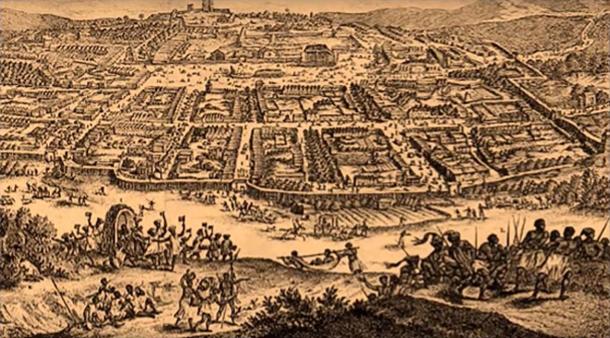
The Ghana Empire, founded by the Soninke, thrived on gold and trade, shaping West Africa’s history and inspiring modern Ghana’s name.
The Ghana Empire: Origins and Influence Across West Africa
Long before modern Ghana took its place on the world stage, another Ghana, known as the Ghana Empire or Wagadugu, flourished as one of Africa’s earliest and most powerful civilizations. Though geographically located in present-day southeastern Mauritania, western Mali, and parts of Senegal, the empire left such a lasting impression on history that later Europeans mistakenly extended the name “Ghana” to the Gold Coast colony, which would eventually become today’s Ghana. The Ghana Empire’s origins, trade networks, and influence helped shape the foundations of West African civilization.
The Origins of the Ghana Empire
Historians trace the origins of the Ghana Empire as far back as the 6th century CE. It was founded by the Soninke people, a Mande-speaking group who settled in the Sahel, where savannah and desert meet. Known to themselves as “Wagadugu,” the empire earned the name “Ghana” from the honorific title given to its kings, meaning “War Chief” or “King of Gold.”
The empire’s location was strategic. Positioned between the Sahara Desert and the forests of West Africa, it became a natural hub for trade between North African Berber merchants and the rich agricultural and mineral-producing regions to the south.
The Role of Gold and Trade
Gold was the lifeblood of the Ghana Empire. Vast deposits of gold dust from the Wangara region and Bambuk mines provided the wealth that made Ghana famous across the medieval world. North African traders, seeking gold, crossed the Sahara with caravans of salt, textiles, and horses. In return, they received gold, ivory, kola nuts, and slaves.
Salt was especially valuable in West Africa, not just for flavoring food but also for preserving it in the hot climate. The empire sat at the crossroads of these vital trade routes, levying taxes on goods that passed through its markets. These taxes filled the empire’s coffers and strengthened its military power.
The city of Kumbi Saleh became the empire’s thriving capital. It was known to Arab chroniclers as a bustling center of commerce, boasting markets filled with traders, livestock, and artisans. The city was divided into two parts—one for the king and his court, and another for Muslim traders who brought with them not only goods but also Islamic culture and education.
Political Power and Governance
The Ghana Empire’s rulers commanded respect and authority. The king controlled the gold trade tightly, ensuring that only gold dust was circulated, while large nuggets were kept exclusively by the crown. This policy maintained the value of gold and reinforced the king’s supremacy.
The empire was structured around a strong central authority, supported by local governors and vassal chiefs who managed surrounding territories. The king’s court was said to be magnificent, with soldiers, interpreters, and officials who ensured order in the vast empire.
The empire’s military might also contributed to its success. With cavalry and infantry, the Ghana Empire defended its borders, protected trade routes, and expanded its influence over neighboring regions.
Cultural and Religious Influences
Although the Soninke people practiced traditional African religions, Islam gradually gained a foothold through trade with North African merchants. Muslim scholars and traders settled in the empire’s towns, building mosques and schools. Still, the kings themselves largely retained their indigenous religious practices, which emphasized ancestral worship and spiritual connections to the land.
This coexistence between Islam and traditional beliefs created a rich cultural blend that would influence later West African empires such as Mali and Songhai.
Decline of the Ghana Empire
By the 11th century, the Ghana Empire faced growing challenges. The Almoravids, a Berber Muslim dynasty from North Africa, launched military campaigns that disrupted trade routes and weakened the empire’s control. Internal rebellions by vassal states further destabilized the kingdom.
By the 13th century, the empire had largely declined, giving way to the rise of the Mali Empire under the leadership of Sundiata Keita. Yet the legacy of Ghana remained as a symbol of wealth, power, and the flourishing of African civilization.
Lasting Legacy
The Ghana Empire was one of the first great trading states of sub-Saharan Africa, and its wealth dazzled travelers and historians alike. Arab chroniclers such as Al-Bakri described its splendor in awe, highlighting its influence across the medieval world.
It is no coincidence that when the Gold Coast gained independence in 1957, it chose the name “Ghana” to honor the memory of this ancient empire. Though separated by geography, the spirit of greatness, wealth, and cultural pride connects the ancient Ghana Empire with the modern nation.
Conclusion
The Ghana Empire, or Wagadugu, stands as a landmark in African history. Through its mastery of trade, gold, and governance, it became a beacon of prosperity and cultural exchange in West Africa. Its story is not just one of power and wealth but also of resilience and heritage—a reminder that African civilizations were dynamic and influential long before European contact.
RECOMMENDED ARTICLES
- Free SHS Policy in Ghana: Access and Impact
- Akan Day Names: Identity in Every Birth
- Dr. J.B. Danquah: Ghana’s Freedom Fighter
- Damba Festival: Celebrating Northern Ghana’s Rich Cultural Heritage
USEFUL LINKS
